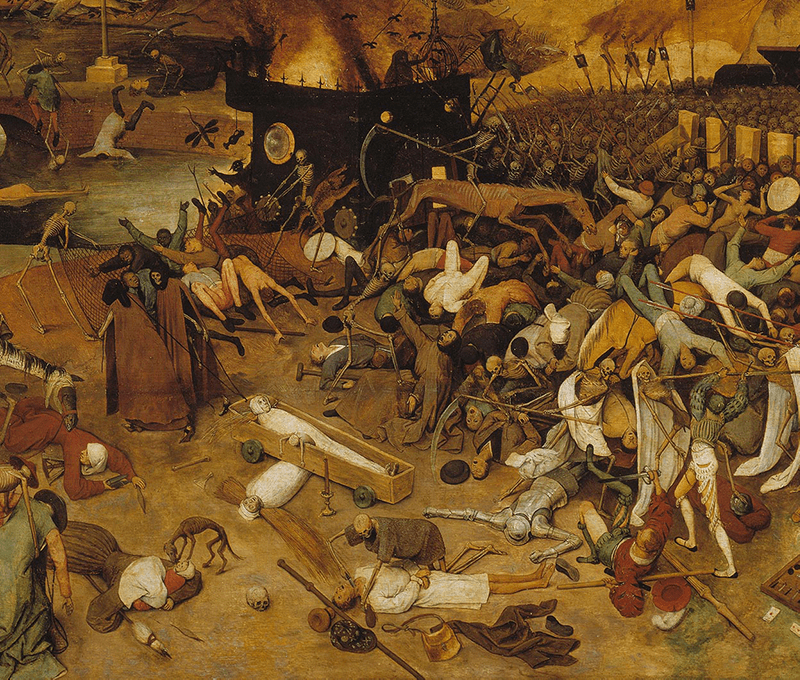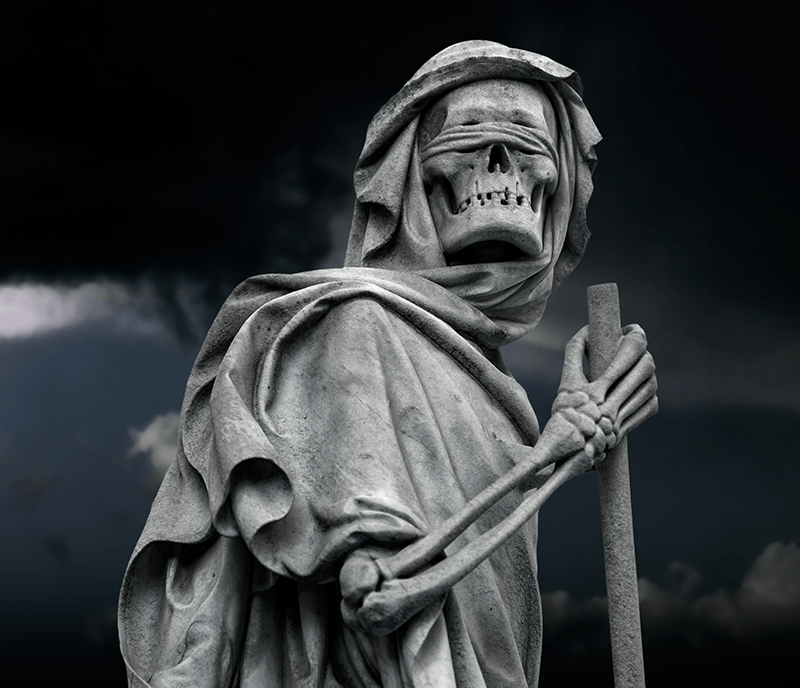Death has always fascinated and, in general, terrified us. But our reactions have also shown enormous variety, both in time and place. Most often the prospect of dying indeed filled us with fear, but throughout history there also were more rational reactions, such as simple acceptance of the inevitable, resignation, even indifference, which made the prospect of dying a lot less daunting and life a lot more pleasant.
Excessive fear of death is a big problem
Throughout history the human population remained more or less stable. This changed dramatically in the second half of the 20th century when it skyrocketed, mainly because mortality was reduced sharply by improvements in hygiene, nutrition and medicine. This is generally viewed as a triumph of human ingenuity but it has serious downsides:
- overpopulation to unsustainable levels
- survival of unfit individuals on a massive scale
- ageing of the population
Fear is never a good counsellor because it clouds our judgment and makes us react in irrational ways. Few things inspire more fear than death, so it's no surprise that few things make us more irrational. Just think of the distinction we make between dying in a car accident and dying in a terrorist attack. The former is accepted quite stoically as the price we pay for mobility, the latter leads to nation-wide hysteria, while the risk of death by terrorism is microscopic.
Odds of an American dying in a motor vehicle accident is about 1 in 110
Odds of an American dying at the hands of a terrorist is more than 1 in 45,000
As such death is a normal, perfectly natural event and also an essential one because it enables evolution to work its magic, by replacing the old with the young, the sick with the healthy, the unfit with the fit.
In the short term we have succeeded at delaying death. Infant mortality has been sharply reduced, serious diseases and accidents have become less fatal, old people are kept alive much longer than before. On the surface this looks great, but the downside is a terrible one, setting the stage for a triumph of death unlike any ever witnessed before, reminiscent of Breughel's horrific masterpiece.

What we have actually been doing is disrupt the balance of nature, by ignoring, and even reversing, one of nature's most basic laws: survival of the fittest through natural selection, the very essence of evolution. This law made possible the wondrous success of evolution, the creation of millions of species from the simplest beginnings, enabling the members of every species, from the biggest to the smallest, to struggle for the privilege of living. If an individual succeeds and reproduces, its successful genes are passed on to its offspring. Unsuccessful individuals simply die, taking their unsuccessful genes with them. This worked like a charm for billions of years.
Reason demands that we should try to follow this superb example, but we don’t. We simply reject survival of the fittest, inspired not by reason but by our emotional rejection of death, even when it benefits the species.
Instead of fostering the fittest, we have embraced the unfit.
The consequences spell suicide for our species.
First and foremost it has led to a population explosion, which has driven up our numbers to heights that are already unsustainable now and are still rising. Although the growth rate peaked in the 1960s and has been going down since then, the world population is still on track to reach more than 11 billion in 2100. As our numbers are already unsustainable now, it will be obvious that this can never happen. Our natural environment will simply not be able to support such numbers and collapse long before that time.
Not only have our numbers grown ominously, but our overall fitness has gone down dramatically. The survivors include many weak, sick and handicapped individuals, young and old, all needing special care, which places an enormous burden on society and will only get worse as our numbers grow further, also increasing the risk of hereditary defects being passed down to following generations.
In 2016 $3.3 trillion was spent on health care in the USA alone, that is 17.9% of the GDP or more than $10,000 a person.
Science isn't helping either. Instead of seeking solutions to the problem of overpopulation, it keeps on making things worse by doggedly trying to save and prolong more human lives, with good intentions, no doubt, but actually widening the road to hell.
At this point in time we desperately need to reduce our numbers, but there is no feasible way of doing so. We dread death too much to use it to our advantage. We even frown on voluntary euthanasia, when people want to end their own unbearable suffering.
Another example is modern opposition to capital punishment. Nobody can deny that dangerous criminals should be removed from society. CP does exactly that, effectively and permanently, and has been used by all civilizations and endorsed by nearly all religions throughout history. Numerically it is not very important. According to Amnesty International 1,032 people were executed in 2016 (not counting China which does not publish its data). Compared with the millions dying every year from other human causes such as wars, pollution, traffic accidents and medical errors, this is no reason to get overly excited. And yet, abolitionists treat CP as one of the major issues of our time with a vehemence and fanaticism that make little sense. As strong emotions always impair judgment, it is not surprising that their views of capital punishment are far from rational.
Their arguments are consistently weak. They nearly always use emotionally charged words that are not accurate. It is absurd to compare the administration of justice to murder. Crime and punishment are not the same. Their alleged high moral ground does not give them the right to behave immorally, which they often do by being less than truthful. They malign opponents as stupid, ignorant, uncivilized and brutal, ignore arguments in favor of CP, exaggerate the risk of wrongful executions, belittle the deterrent effect, stress the large number of countries that have abolished CP but fail to mention that these are mainly smaller countries, whose inhabitants number less than 25% of the world population. Even more disturbingly Britain and the EU in particular have actively tried to link the abolition of CP to the provision of monetary aid to weaker countries, which is a form of coercion akin to blackmail, both criminal offences. All this suggests that the apparent success of the abolitionist movement rests on very shaky pillars.
Abolitionists also consistently ignore the will of the people. When England stopped executions in 1965, three quarters of the population disagreed.
The main reasons given for the abolition of CP are:
- human life is too valuable to take (this is just an expression of hubris; with the current overpopulation even an average human life has become a liability for mankind; the life of a dangerous criminal cannot be called valuable by any stretch of the imagination);
- everyone has a right to life (not really; the phrase is from the Universal Declaration of Human Rights, which has no binding force, and was certainly not intended to protect violators of human rights, witness the fact that 40 of the 48 countries voting in its favour still had CP at the time);
- CP is torture (no, it can be done painlessly, and even a short spell of pain does not amount to torture; besides, it's a punishment not a reward);
- mistakes can be made (indeed, human error is always a possibility, but that's no reason not to do what needs to be done; human error kills millions of people every year in countless other situations, from driving cars to medical procedures)
- it's too expensive (no, it can be done very cheaply; it's only outrageously expensive now because abolitionists insist on long and senseless appeals)
- it does not deter (unlikely; everything we do is based on attraction and deterrence: we do what benefits us and avoid what might harm us; there is no sane reason why this should be different for CP; this is also refuted by several serious studies).
Although abolitionists have had considerable success, it is doubtful whether this will endure. Their arguments are not truly convincing and while their heavy-handed approach may intimidate ordinary people into changing their votes, it probably does not change their minds. In 1966, when abolitionists had been very active, only 42% of Americans said that they favored CP but in 1994 their number had risen again to 80%.
Given the small numbers of people involved, capital punishment is not really a big deal, certainly not from an existential angle. What is important, however, is the perversely homocentric message that its opponents spread: the self-obsessed delusion that all humans (including the speakers) are too precious to kill, no matter how vile and harmful they are. This groundless self-glorification is an attitude that has played a big part in humanity's disdain for the natural world and needs to be dropped immediately if the environment is to be saved.
"If a man has not discovered something that he will die for, he isn't fit to live."
Martin Luther King, Jr.
"Without health life is not life; it is only a state of langour and suffering - an image of death."
Buddha
"Death does not concern us, because as long as we exist, death is not here. And when it does come, we no longer exist."
Epicurus
"Millions long for immortality who don't know what to do with themselves on a rainy Sunday afternoon."
Susan Ertz




